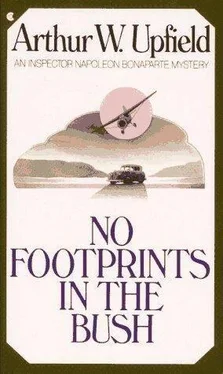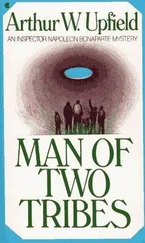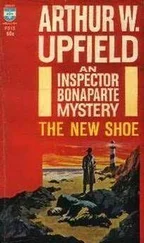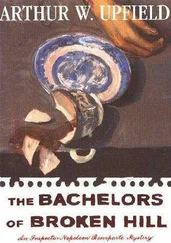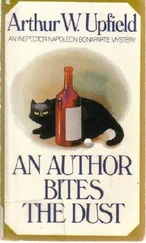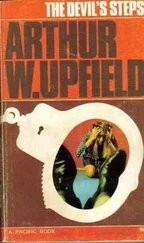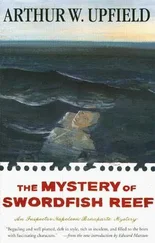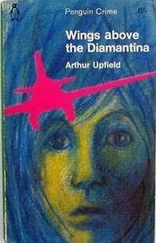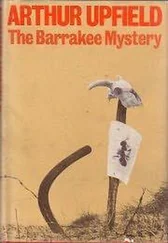Arthur Upfield - No footprints in the bush
Здесь есть возможность читать онлайн «Arthur Upfield - No footprints in the bush» весь текст электронной книги совершенно бесплатно (целиком полную версию без сокращений). В некоторых случаях можно слушать аудио, скачать через торрент в формате fb2 и присутствует краткое содержание. Жанр: Классический детектив, на английском языке. Описание произведения, (предисловие) а так же отзывы посетителей доступны на портале библиотеки ЛибКат.
- Название:No footprints in the bush
- Автор:
- Жанр:
- Год:неизвестен
- ISBN:нет данных
- Рейтинг книги:5 / 5. Голосов: 1
-
Избранное:Добавить в избранное
- Отзывы:
-
Ваша оценка:
- 100
- 1
- 2
- 3
- 4
- 5
No footprints in the bush: краткое содержание, описание и аннотация
Предлагаем к чтению аннотацию, описание, краткое содержание или предисловие (зависит от того, что написал сам автор книги «No footprints in the bush»). Если вы не нашли необходимую информацию о книге — напишите в комментариях, мы постараемся отыскать её.
No footprints in the bush — читать онлайн бесплатно полную книгу (весь текст) целиком
Ниже представлен текст книги, разбитый по страницам. Система сохранения места последней прочитанной страницы, позволяет с удобством читать онлайн бесплатно книгу «No footprints in the bush», без необходимости каждый раз заново искать на чём Вы остановились. Поставьте закладку, и сможете в любой момент перейти на страницу, на которой закончили чтение.
Интервал:
Закладка:
“Meanwhile, Rex, knowing his father had gone outback in the car, and having failed to see any surrender signal, swiftly planned a counter move. With five of his bucks he travelled to the station road where it is crossed by the telephone line. The McPherson came along in his car, saw the break, and stopped to repair it, the wire having been cut, of course, by Rex.
“We know that Rex wants his father to retire from the station and hand the property over to him, and it seems probable that he saw the opportunity of personally persuading his father to accept the transfer. Markyou, I say it is probable, not certain. Rex had with him a portable telephone, and he might have had the intention of compelling his father to call up the homestead office and ask either Miss McPherson or myself to go out to him as his car had broken down.
“Anyway, whatever it was Rex wanted his father to do The McPherson refused to do it. I have the evidence to prove how determined is this young man. He obtained stalks of cane-grass and made fine splinters which he thrust under his father’s fingernails.”
“Oh!” exclaimed Flora, her face white and anguished.
“This method of torture is never practised by the aborigines,” Bony went on. “In fact, the aborigines are not given to torture of any kind. Rex, however, is allied to the white race which, with other races, has indulged with energy in the art of inflicting pain. We know how long it takes to breed vice out of animals, even to breed out physical defects, so that the strange personality called Rex McPherson cannot be attributed to his mother or his mother’s people.
“His objective when forcing The McPherson to use the portable telephone was to get me into his power or, which seems more likely, to get Miss McPherson into his power when he could use her as a powerful lever for his blackmail.”
“But-” interrupted Flora.
“One moment, please. The McPherson refused to accede to his son’s demands and so submitted to torture. Blood drops on the ground and the cane-grass splinters illustrate the method of torture. Failing to achieve his desire, Rex and his blacks returned to their country.
“The McPherson revealed wonderful stoicism when he managed to mend the cut telephone wire, and then drove his car back to Watson’s Bore, for there are blood stains on the wire and on the steering wheel of his car.
“At Watson’s Bore the aborigines concocted a medicament for his wounded fingers by pulverizing gum leaves on a nardoo stone and mixing the paste with beef fat. Then, with his hands bandaged, The McPherson instructed each of them to take a quantity of flour in a calico bag, those of them best able to use a rifle were given a weapon and cartridges, and the expedition set out whilst we were examining the scene where the telephone wire was cut.
“The McPherson, to my way of reasoning, has gone off on a fruitless errand. He and the aborigines with him saw those Illprinka smoke signals and accepted their intelligence that a corroboree was to be held at Duck Lake and all Illprinka men were going back to Duck Lake. He probably has the idea of destroying Rex’s headquarters which he believes are situated at Duck Lake, to destroy the aeroplane and then if Rex escapes to hunt him down and destroy him. I think that those smoke signals form a part of Rex McPherson’s newest plan to obtain the station, and therefore should be disregarded. We must not forget that Duck Lake is far away and that the surrounding country does not offer the wonderful camouflage that that great area of cane-grass does at the western end of the plain.
“The McPherson may succeed. I doubt it. He sees no farther than visible smoke signals: I try to see into the mind of-”
Bony was stopped by the sharp ringing of the telephone bell. He rose without comment and placed the receiver to his ear. The others sat quite still, waiting, listening, trying to ascertain from Bony’s replies who was calling. Whilst speaking he kept his back to them. Then he replaced the receiver and turned to them, eyes sparkling andface smiling.
“That was Constable Price,” he said. “Doctor Whyte has just passed over the township. He dropped a message asking them to tell us to have the landing ground here illuminated for his landing. He’ll be here in twenty minutes or half an hour. Burning Water! Race to the camp and bring all your people.”
Chapter Fourteen
A Happy Landing
WHEN Henry Whyte emerged from protected adolescence to face the wide and very wicked world he was arrayed in the uniform of an officer of the Royal Air Force, and he was sent up into the blue to battle with his country’s enemies. Fortunately for him, that was in the summer of 1918 when German air power was paralysed, and thus he received a sporting chance of survival.
Perhaps it was that he happened to be the seventh son of a seventh son, or it might have been that he was born in a year divisible by seven, but from the day of his first solo flight in training the history of his life was red-lettered with luck. At least this was said by his friends to account for his escapes from The Reaper.
In his somewhat unordinary character was a streak of cautiousness which really ought to erase many of the red letters, for many of his escapes from death were directly due to forethought and thoroughness in planning for the future. He was one of many sons of the rich who burn with ambition to do something.
After demobilization, Major Henry Whyte settled down to win his medical degree, and, having accomplished this, he was looking about for a practice when he happened to read an article describing the work of the first Flying Parson in Australia, whose head-quarters were at Wilcannia, N.S. W., and whose parish was half the size of England. The corollary of the Flying Parson, of course, was the Flying Doctor.
Thus it was that Doctor Whyte came to Australia in 1927, then obtaining his transfer to the Australian register and taking a refresher course in aerial navigation. Ample means enabled him to begin his newly found career with means sufficient to stand the drain of two machines every year. They did not wear out, like motor cars.
Selecting Birdsville for his headquarters, Doctor Whyte never hesitated to fly anywhere in all weathers to succour men and women, even to transport them to the town hospital, to search for lost explorers, and to enhance the well being of a meagre population inhabiting a vast area of country.
He received Bony’s telegram, dispatched by Constable Price and purporting to be sent by McPherson, when he arrived home at four o’clock in the afternoon from a long trip. Glancing through his case-book and finding himself comparatively free, he left Birdsville at six on the 400-mile journey to McPherson’s Station where he had gazed into shy blue eyes and had felt tender red lips clinging to his own.
He ought to have arrived at the McPherson homestead when Flora and her small party were stopped at the break in the station telephone line, but then he was still engaged on the slight repairs to his engine the failure of which had caused a forced landing on a gibber plain one hundred miles south of Shaw’s Lagoon. He got off the ground just before night took possession of it.
He ought then to have returned to Birdsville where his own landing ground would have been illuminated to receive him. What he did was to set off to locate a tiny outpost blanketed by night, unmarked by street lamps, an infinitesimal dot no larger than a pea on a football ground, trusting to his navigational skill to locate Shaw’s Lagoon and so be able to reset the course to McPherson’s Station.
He made an error of a sixty-ninth of a degree in his calculations worked out when his machine was high above the shrouded world and flying in the twilight of the sky. The error was small, but it might well have ended in a disastrous night landing. He passed Shaw’s Lagoon fourteen miles to the west of the township, but quickly discovered his error and turned in an effort to find it-the pea lying on the football ground at night.
Читать дальшеИнтервал:
Закладка:
Похожие книги на «No footprints in the bush»
Представляем Вашему вниманию похожие книги на «No footprints in the bush» списком для выбора. Мы отобрали схожую по названию и смыслу литературу в надежде предоставить читателям больше вариантов отыскать новые, интересные, ещё непрочитанные произведения.
Обсуждение, отзывы о книге «No footprints in the bush» и просто собственные мнения читателей. Оставьте ваши комментарии, напишите, что Вы думаете о произведении, его смысле или главных героях. Укажите что конкретно понравилось, а что нет, и почему Вы так считаете.
